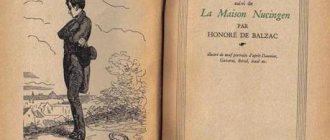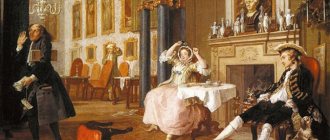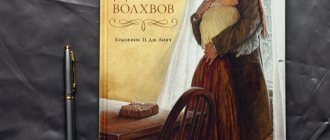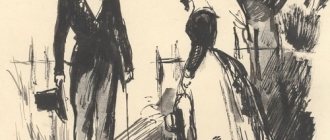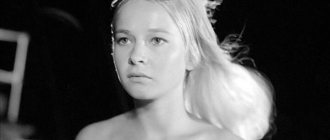About the product
The story “The Grammar of Love” by Bunin was written in 1915. Like most of the writer’s works, the book is dedicated to love. This was the favorite theme of Bunin’s entire work, who, like no one else, could show all the diversity and versatility of this feeling.
We recommend reading a summary of “The Grammar of Love” online, and then taking a test to test your knowledge. This retelling will be useful in preparing for a literature lesson.
The material was prepared jointly with a teacher of the highest category, Kuchmina Nadezhda Vladimirovna.
Experience as a teacher of Russian language and literature - 27 years.
Summary of the events of the story
Ivlev heads to the far edge of his estate, leaving his brother-in-law. On the way, he passes through the estate of Khvoshchinsky, his neighbor, whose story excites his mind.
It starts to rain heavily. Maly, who manages the horses, asks to give them a break, and Ivlev makes the final decision to go to Khvoshchinsky’s estate - to examine the old estate and purchase a library. They pass the cliff from which Lushka jumped. With difficulty, the hero remembers that in his youth he rode through these places on horseback.
They enter the estate. They are met by Khvoshchinsky's son - he is extremely surprised by the unexpected guests, is very worried, but does not refuse them a visit. At Ivleva’s request, he shows the room in which Khvoshchinsky locked himself and his library. He says that his father was not crazy, but became a recluse and all his life he regretted the death of Lushka - after that he bought wedding candles and a wedding ring, which he always wore.
Ivlev, looking through the library, comes across “The Grammar of Love” - a small book that Khvoshchinsky himself compiled. She interests him, and he buys her from the landowner's son for a lot of money, although the young man at first does not want to sell her.
Summary
At the beginning of June, the landowner Ivlev went “to the far edge of his district.” At first, the trip pleased him: it was a warm summer day, permeated with the aromas of forbs and the singing of a lark. But soon “the weather became dull, mottled clouds came from all sides,” and a light rain began to fall. In order not to find himself in the middle of a field in the pouring rain, Ivlev decided to stop by a friend of the count who lived nearby. From the old plowman he learned that “there is only a young countess at home,” but this did not stop him.
The Countess greeted the guest in an open dress with a deep neckline and powdered breasts. “She smoked, taking deep drags,” and all conversations invariably turned to love. In the conversation, the countess mentioned “her close neighbor, the landowner Khvoshchinsky,” who died this winter. All his life he suffered from love for the maid Lushka, whom he literally idolized.
Ivlev continued on his way, and “the rain had already stopped for real.” Thinking about the fate of Khvoshchinsky, he decided to visit the “empty sanctuary of the mysterious Lushka.” Ivlev wanted to find out for himself whether he was crazy or just a hostage to a fatal passion.
“According to the stories of old landowners” Khvoshchinsky once had the reputation of being a rare clever man. But, like a bolt from the blue, this love for Lushka fell on him, “then her unexpected death,” and the man’s life went awry. He locked himself in the room where his beloved lived and died, and “sat on her bed for more than twenty years.” Khvoshchinsky “not only did not go anywhere, but did not even show himself to anyone at his estate.”
A handsome “young man in a gray school blouse” stood on the porch of an unkempt estate, looking at the unexpected guests with surprise. Ivlev realized: “this is the son of the famous Lushka,” and he explained his sudden arrival to the young man by saying that he “wanted to look and maybe buy Khvoshchinsky’s library.”
During the conversation, the young man became embarrassed, spoke hastily, but in monosyllables, and often blushed. It was noticeable that he was very happy about the opportunity to sell books. When Ivlev casually mentioned his father’s illness, the young man flushed and remarked that “they were not mentally ill at all,” and this was all idle gossip.
In that half of the house where the landowner Khvoshchinsky spent his last days, it was very cold: no one lived here, and the room was not heated. In the hall, Ivlev noticed wedding candles near the images. To his undisguised surprise, the young man replied with embarrassment that “after her death they bought these candles... and even always wore a wedding ring...”. He led his guest into a small, dark room containing only a bare iron cot and two bookcases.
Ivlev began to look at the library of the late Khvoshchinsky. It was based on novels and dream books - “this is what fed that lonely soul that forever shut itself off from the world in this closet.” On the middle shelf, Ivlev noticed a thin book and an old box in which there was Lushka’s necklace - “a worn cord, with cheap blue balls on it.”
Looking at the beads of the woman who was loved so much during life and after death, Ivlev’s head began to spin. The tiny book turned out to be “The Grammar of Love, or the Art of Loving and Being Mutually Loved.” The young man timidly said that he could not sell it, since it was very dear to his late father.
Ivlev asked permission to at least look at it and, having received consent, began to slowly leaf through it. The book was divided into small chapters, and each of them “consisted of short, elegant, sometimes very subtle maxims.” On the last blank page, written in beaded handwriting, was a quatrain composed by Khvoshchinsky.
Of all the books, Ivlev chose only one - “The Grammar of Love...”, paying a lot of money for it. On the way home, the coachman began to tell him that young Khvoshchinsky lived with the deacon’s wife, but Ivlev did not listen to him. All his thoughts were occupied by Lushka and the excitement that gripped him at the sight of her modest necklace. These feelings were similar to those he experienced in Italy “when looking at the relics of a saint.”
Ivlev realized that Lushka, unknown to him, who died twenty years ago, had entered his life forever. Taking out “The Grammar of Love...”, he once again re-read the lines written by Khvoshchinsky.
The hearts of those who love will tell you: “Live in sweet traditions!” And their grandchildren and great-grandchildren will be shown this Grammar of Love.
Brief description of the characters in the story
| Hero | Characteristic |
| Ivlev | The main character of the story. A landowner touring his property. All summer he stayed with his brother-in-law, who gave him a tarantass and hired horses from a rich village man. He is interested in the love story of Khvoshchinsky and Lushka; it seems to him that the woman has become legendary, although only twenty years have passed since her death. He buys a book compiled by his father from Khvoshchinsky’s son for a lot of money. |
| Small | The son of a rich man from whom Ivlev hired a troika. He rules horses, thinks about something all the time, rarely speaks to Ivlev. He takes pity on the horses and persuades Ivlev to make a stop at Khvoshchinsky’s estate, saying that the horses are tired and need to rest. |
| Landowner Khvoshchinsky | Deceased landowner, Ivlev's neighbor. According to legend, he fell in love with a serf, had a child with her, but could not marry the girl due to the difference in status. After the girl’s death, he went crazy, locked himself in the estate and did not leave the room, constantly reading books. According to his son, he was not mentally ill, but he really locked himself in the estate - in a small room with a bed and a small library, consisting of two cabinets with books. He probably locked himself away out of guilt - after the girl’s death, he purchased wedding candles and a wedding ring, which he wore until his death. He himself composes a small book - “The Grammar of Love”. |
| A young man, the son of Khvoshchinsky | A high school student, a guy with black hair, beautiful eyes, a pale, freckled face. Ivlev notes its beauty. Son of Lushka and Khvoshchinsky. Confused by the unexpected visit of Ivlev, who hides behind the purchase of a library left over from a deceased landowner. He speaks hastily and monosyllabically, and gets confused in his words, probably out of embarrassment. Shows Ivlev the estate and the library. At first he refuses to sell the “Grammar of Love” written by his father, allowing only to view it, but in the end he gives it to Ivlev for a lot of money. He tells how his father behaved after the death of his mother, denies that he was insane. |
| Lushka | Khvoshchinsky's serfdom. She fell in love with him and bore him a son, but could not bear the shame and drowned herself by jumping from a cliff into the water. During her lifetime, she did not become the wife of a landowner because of the difference in status - a nobleman could not marry a serf, and she was forever known as his mistress. After her death, the landowner closes himself on the estate, buys an engagement ring and regrets that he did not marry the woman he loved. |
Story test
Check your memorization of the summary content with the test:
- /10
Question 1 of 10Who is the author of “The Grammar of Love”?
Start test
Hall of Fame
To get here, take the test.
- Kristina Makhnatkina
8/10
- Vlad Semyonov
10/10
- Nikita Belykh
3/10
The meaning of the work
The story says that the love of Khvoshchinsky and Lushka has become legendary - despite the fact that only 20 years have passed, it seems to Ivlev that the legend about them has been circulating for a long time. He is interested in the landowner and how he lived.
Khvoshchinsky himself could not bear the mistakes he made in his youth and the fact that he refused strong love due to the fact that the woman he loved was a serf. He locked himself in the estate and did something that he had not done during Lushka’s lifetime (he bought a wedding ring and candles for the wedding). The landowner did not marry, and left behind “The Grammar of Love” as an edification to descendants about how to love.
History shows that love is a great feeling that can lead to any consequences. There is no need to be afraid of him, but sometimes you need to learn to love, to show your feelings to the one you love.
Bunin I.A. — Grammar of Love
174 0
A certain Ivlev was traveling one day in early June to the far edge of his district. The ride was pleasant at first. Warm, dim day, well-trodden road. Then the weather became dull, clouds began to gather, and when the village appeared ahead, Ivlev decided to call on the count. An old man plowing near the village said that there was only a young countess at home, but we stopped by anyway. The Countess was wearing a pink bonnet, with her powdered breasts exposed. She smoked, often straightened her hair, exposing her tight and round arms to her shoulders. She focused all her conversations on love and, by the way, told about her neighbor, the landowner Khvoshchinsky, who died this winter and, as Ivlev knew from childhood, all his life he was obsessed with love for his maid Lushka, who died in early youth.
When Ivlev drove on, the rain had already started to really stop. “So Khvoshchinsky died,” thought Ivlev. “You should definitely stop by and take a look at the empty sanctuary of the mysterious Lushka... What kind of a person this Khvoshchinsky was.” Crazy. Or just a dazed soul? According to the stories of old landowners, Khvoshchinsky was once known in the district as a rare clever man. And suddenly this Lushka fell on him - and everything went to dust. He locked himself in the room where Lushka lived and died, and sat on her bed for more than twenty years... It was getting dark, the rain was thinning, and Khvoshchinskoye appeared behind the forest. Ivlev looked at the approaching estate, and it seemed to him that Lushka lived and died not twenty years ago, but almost in time immemorial. The façade of the estate, with its small windows in the thick walls, was unusually boring.
But the gloomy porches were huge, on one of which stood a young man in a school blouse, black, with beautiful eyes and very pretty, although completely freckled. To somehow justify his visit, Ivlev said that he wanted to see and maybe buy the library of the late master. The young man, blushing deeply, led him into the house. “So he is the son of the famous Lushka!” - thought Ivlev, looking around the house and, gradually, its owner. The young man answered questions hastily, but in monosyllables, out of shyness, apparently, and out of greed. He was so terribly happy about the opportunity to sell books at a high price. Through the dim entryway, covered with straw, he led Ivlev into a large and inhospitable hallway, covered with newspapers. Then they entered a cold hall, which occupied almost half of the entire house.
In the shrine, on a dark ancient image in a silver robe, lay wedding candles. “Father bought them after her death,” muttered the young man, “and they even always wore a wedding ring...” The floor in the hall was covered with dried bees, as was the empty living room. Then they passed some gloomy room with a couch, and the young man with great difficulty unlocked the low door. Ivlev saw a closet with two windows. There was a bare cot against one wall, and two bookcases—a library—at the other. Strange books made up this library. “The sworn tract”, “The morning star and the night demons”, “Reflections on the mysteries of the universe”, “A wonderful journey to a magical land”, “The newest dream book” - this is what the lonely soul of the recluse fed on, “there is being... it is neither a dream nor a vigil ..."
The sun peeked out from behind the lilac clouds and strangely illuminated this poor haven of love, which had transformed an entire human life into some kind of ecstatic life, a life that could have been the most ordinary life, if Lushka hadn’t happened to be mysterious in its charm... “What is this?” - Ivlev asked, leaning towards the middle shelf, on which lay only one very small book, similar to a prayer book, and stood a darkened box. In the box lay the necklace of the late Lushka - a bunch of cheap blue balls. And such excitement took possession of Ivlev when he looked at this necklace, lying on the neck of the once so beloved woman, that his heart began to beat wildly. Ivlev carefully put the box in place and took up the book. It was the charming “Grammar of Love, or the Art of Loving and Being Mutually Loved,” published almost a hundred years ago.
“Unfortunately, I cannot sell this book,” the young man said with difficulty, “it is very expensive...” Overcoming awkwardness, Ivlev began to slowly leaf through the “Grammar.” It was all divided into small chapters. “About beauty”, “About the heart”, “About the mind”, “About the signs of love”... Each chapter consisted of short and elegant maxims, some of which were delicately about Then came “an explanation of the language of flowers”, and again there was something noted.
And on the blank page at the very end there was a quatrain written in small beads with the same pen. The young man craned his neck and said with a fake grin. “They made it up themselves...” Half an hour later, Ivlev said goodbye to him with relief. Of all the books, he bought only this little book at an expensive price. On the way back, the coachman said that young Khvoshchinsky lived with the deacon’s wife, but Ivlev did not listen. He kept thinking about Lushka, about her necklace, which left in him a complex feeling, similar to what he once experienced in an Italian town when looking at the relics of a saint. “She entered my life forever!” - he thought. And, taking the “Grammar of Love” out of his pocket, he slowly re-read the poems written on its last page.
The hearts of those who love will tell you. “Live in sweet legends!” And they will show their grandchildren and great-grandchildren this Grammar of Love..
